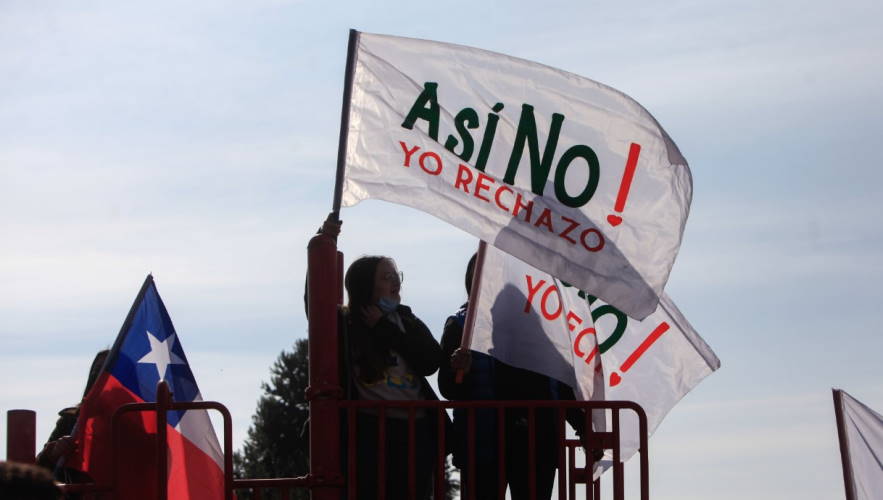Havana Cuba. — The results of the so-called “plebiscite” this Sunday in Chile (which, in reality, was a referendum, since the purpose of the consultation was to approve or reject a text already drafted) have made headlines in the international press. In leftist organs, such as TeleSursocializers of all stripes, as if they were dogs from whom a bone has been hidden, lament and try to find a justification for a reality that seems inexplicable to them.
In truth, the evolution of recent years in the long southern country would seem to justify the false expectations of those “reds”. Let us remember the “social outbreak” of 2019 and 2020, which wanted to be presented as an expression of “popular discontent”, but which, in reality, showed signs of well-orchestrated and directed subversive rebellion, as demonstrated by perfectly planned acts, for the systematic destruction of the Santiago metro.
Added to these scandalous events at the political level was the large majority reached at the polls for the proposal to draft a new Constitution. This was combined with the defeat suffered by the right-wing political forces in the elections to choose the members of the Constituent Assembly. The same thing happened with the presidential election, which opened the doors of the Palacio de la Moneda to its current tenant: the young Gabriel Boric.
It seemed, then, that in Chile, too, public opinion had definitively shifted to the left. Judging by the facts just narrated, anyone would say that the sister country, which exhibits the highest rates of development and has achieved the greatest economic successes, would have definitively embraced the postulates of those who want to make a “clean slate” with what exists and change everything.
Fortunately, this Sunday’s plebiscite-referendum has radically changed the political scene. Chilean institutions have demonstrated their solidity and the electorate has shown that the leftist tendencies and fickleness that I referred to earlier were not irreversible. That, at least for the moment, this important and successful country will not follow the uncertain path that, in recent months, Honduras, Peru or Colombia have chosen.
As a lawyer, it seems convenient to me not to remain in the political epidermis of this important event. It seems opportune, for the benefit of the readers of CubaNetmake an allusion to the current Chilean Constitution (which will continue in force by virtue of the triumph of the “Rejection”) and point out the fundamental features of the project that disavowed the sovereign people.
With regard to the current Constitution in Chile today, it is fashionable (especially among leftists and useful idiots) to proclaim that it comes from the Pinochet dictatorship. That statement, made in those terms, is misleading. It is true that the bulk of the text in question comes from the stage of government of the authoritarian general, but what the “reds” and their allies usually silence are the many changes that text has undergone.
In 1989, for example, he underwent a whopping 54 amendments, proposed by consensus by the different political forces. They (in notable contrast to what happened last Sunday) were approved by more than nine-tenths of the voters!
In other words: if we are going to be precise and honest, we cannot limit ourselves to saying that the Magna Carta that governs Chile today comes from the Pinochet era. To speak accurately, it would also be necessary to point out that in 1989, through consensual proposals, it was broadly reformed in a democratic sense, with overwhelming support from the electorate.
Having made this essential clarification, it is convenient that we point out, in contrast, some essential characteristics of the text that has just been rejected by more than 60% of the voters. And let’s clarify, from the outset, that these general features come from the clear leftist tendency that —as I already said— the Chilean electorate has embraced in recent years.
Let’s see what they were, according to colleague Paula Molina, from BBC World, the essential novelties of the rejected Project: 1) From “Democratic Republic” to “Parity Democracy”; 2) From the indigenous omission to “plurinational and intercultural State”; 3) From “The law protects the life of the unborn” to “Ensure conditions for pregnancy, voluntary interruption of pregnancy, voluntary and protected childbirth and maternity”; 4) Pensions, health and care: a “social and democratic state of law”; 5) Water: from “property” to “inappropriate”; and 6) Political system (with which the changes introduced in this field are taken into account).
It should be clarified that this Magna Carta project subscribed to the highly questionable Bolivian theses of plurinationality. Pursuant to these, the consubstantial Chilean nature of each of the country’s children was partially renounced, and each indigenous ethnic group was recognized as a nation. per sewith a series of rights, which included the recognition of its own judicial system.
The frustrated Chilean constituents of 2022 set themselves a highly respectable goal: to achieve greater female participation in State bodies. To achieve this, they drafted precepts of insurmountable clumsiness. One is clearly discriminatory: that the electoral lists are always headed by a woman. And in article 6.2, by providing that, in the collegiate bodies, “at least fifty percent of its members are women”, it leaves the field open for a new type of inequality, since nothing prohibits that —let’s say— females reach 90% and only 10% of its members are men.
Those constituentists also included the long demagogic inventory of “social rights” that the 21st century socialists proclaim and whose practical realization the unwary people who hear those siren songs are waiting for later: “decent housing”, “clean air”, “health ”, “education”, “adequate food”, “water”, “energy”, “sanitation”, etc.
So, it was that draft sectarian and socialist Constitution that the electorate rejected, for the good of Chile. The “rojillos” have no other alternative than to take refuge in statements of shameless interventionism, like the ones just made Gustavo Petro: “Pinochet revived,” he tweeted. It seems that the new Colombian president, as a good socialist of the 21st century, considers himself more capable of determining what is most convenient for Chile than the noble people of that country.
OPINION ARTICLE
The opinions expressed in this article are the sole responsibility of the issuer and do not necessarily represent the opinion of CubaNet.
Receive information from CubaNet on your cell phone through WhatsApp. Send us a message with the word “CUBA” on the phone +525545038831, You can also subscribe to our electronic newsletter by giving click here.















